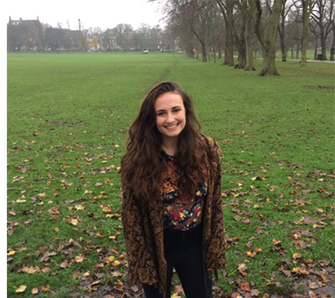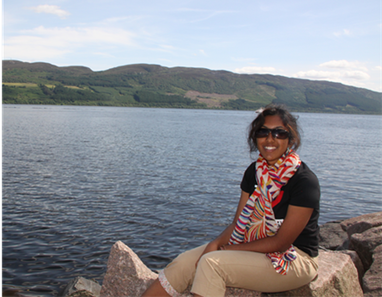Environmental chemistry degrees – then and now
Zoë Fleming (University of Leicester), Hattie Chisnall (University of Edinburgh) and Jashvini Jothieswaran (University of Edinburgh)
ECG Bulletin 2015
ECG Bulletin 2015
On the twentieth anniversary of the ECG Bulletin, Group member Zoë Fleming reflects on her experiences as an environmental chemistry student at the University of Edinburgh from the mid-1990s. Two current first-year students of environmental chemistry at the same University also discuss their experiences, motivations and hopes for the future.
A student’s reflections from twenty years ago
In the early 1990s, it seemed to me that humanity had finally admitted we were causing unnecessary harm to the environment. From a teenager’s perspective, there was an incredible feeling of hope and a belief in the power to reverse this and join together to clean up our act. As awareness of environmental issues grew, we talked our parents into recycling and buying eco-products, tried to plant a tree or two, and pestered our classmates to stop using aerosol deodorant sprays. We thought we could change the world. The 1992 Rio Earth summit became the focus of our hopes. My choice of degree was set upon reading James Lovelock’s The Ages of Gaia: A Biography of our Living Earth and the realisation that chemistry was at the heart of this theory.
A student’s reflections from twenty years ago
In the early 1990s, it seemed to me that humanity had finally admitted we were causing unnecessary harm to the environment. From a teenager’s perspective, there was an incredible feeling of hope and a belief in the power to reverse this and join together to clean up our act. As awareness of environmental issues grew, we talked our parents into recycling and buying eco-products, tried to plant a tree or two, and pestered our classmates to stop using aerosol deodorant sprays. We thought we could change the world. The 1992 Rio Earth summit became the focus of our hopes. My choice of degree was set upon reading James Lovelock’s The Ages of Gaia: A Biography of our Living Earth and the realisation that chemistry was at the heart of this theory.
|
Environmental science degrees were growing in popularity in the 1990s, but degrees in environmental chemistry were only offered at two or three universities in the UK. When I began to study environmental chemistry at Edinburgh University in 1996, we were a tiny minority among the chemists we joined for most lecture courses and labs. In pursuing this degree I hoped to obtain the skills and chemical knowledge to fully understand any damage to the environment caused by humans and the chemical industry and to decipher the disturbance of the intricate balances in our water, soil and air.
Twenty years on, environmental chemists are less on the fringes of the key science questions. Today, we are needed to advise just about every industry. I am sure that environmental chemistry will continue to grow and play a key role in environmental protection, and that it will be taught within many other degree courses due to its interdisciplinary nature and broad relevance within environmental science. Zoë Fleming |
Views of two first-year students today
Having grown up surrounded by the granite city of Aberdeen, the UK’s biggest oil and gas merchant, many of my peers aspired to be a part of this booming industry, but this never really attracted me. Since deciding on a degree, I have realised that I want to be part of a progression into something cleaner, healthier and fresher: renewable energies. I want to do something that makes a difference and I see cleaner energy as an important factor in our progression to a cleaner planet.
Having grown up surrounded by the granite city of Aberdeen, the UK’s biggest oil and gas merchant, many of my peers aspired to be a part of this booming industry, but this never really attracted me. Since deciding on a degree, I have realised that I want to be part of a progression into something cleaner, healthier and fresher: renewable energies. I want to do something that makes a difference and I see cleaner energy as an important factor in our progression to a cleaner planet.
|
My generation has always lived with the pressure to “reuse, reduce and recycle”. Much has been achieved, but this generation can achieve much more. We know how serious the pressure on the Earth is now, and I, like many others my age, want to make a change.
I feel that there is a general optimism about environmental chemistry. A lot has been achieved, including a greater awareness of environmental issues among businesses, and building huge wind turbines all over the country. There is a lot of enthusiasm for change and environmental chemistry supports that enthusiasm. There seems to be more understanding about what environmental chemists can achieve now compared to twenty years ago, and there’s still that enthusiasm but now we know how to go about it a bit more. I really enjoyed chemistry at school. I had great teachers and also enjoyed reading about the subject and gaining a better understanding of how a lot of the world worked. |
I like my degree and feel like I have chosen the right one. It’s been fun finding my feet at university so far. I do not know what job I want after University and I will probably leave that decision until my very last year. Right now it’s just about getting a degree in something I really enjoy, whether it gives me my dream job or not.
Hattie Chisnall
Hattie Chisnall
|
I think environmental chemistry is an important aspect of chemistry. As scientists, we should be helping to find alternative ways to a more sustainable world. I find it interesting because it is a promising field in science as our non-renewable resources are starting to run low.
We only have one Earth and should be doing everything we can to safeguard it rather than destroy it. We do have better ways to synthesise the same products in a more environmentally friendly way. And sometimes the ‘greener’ way could actually also be more cost-effective. I am studying environmental chemistry so I can help in some way to find better alternatives for a greener planet. Jasvini Jothieswaran |
Courses for today’s environmental chemists
A brief web survey of undergraduate degrees (apologies if I have left any out!) via www.whatuni.com reveals environmental chemistry degree courses at Lancaster, Bangor, Aberdeen, York and Edinburgh, all with employment rates of between 81 and 90%.
As an environmental chemistry student who followed my degree with a chemistry PhD, I realised that there were many aspects of environmental science and management that were not included in my training. Knowledge of the interactions between earth, water, and atmospheric chemistry and our responsibility as environmental experts is not a given and must be built up from real world experience, reading up on the subject or further training.
When I was looking for work outside the academic sector a few years ago, I was told that a specialist Masters degree would be extremely helpful to an environmental science professional. There is a huge array of such Masters degrees, including Environmental, Analytical, Green, and Sustainable Chemistry titles as well as Pollution monitoring, Toxicological, Contaminated land, Environmental Assessment, Management, Policy, and Law among the ca. 700 advertised Environmental Masters degree courses at www.findamasters.com. There is no a shortage of degree courses for environmental chemists to choose from today – so no excuses now!
Zoë Fleming
A brief web survey of undergraduate degrees (apologies if I have left any out!) via www.whatuni.com reveals environmental chemistry degree courses at Lancaster, Bangor, Aberdeen, York and Edinburgh, all with employment rates of between 81 and 90%.
As an environmental chemistry student who followed my degree with a chemistry PhD, I realised that there were many aspects of environmental science and management that were not included in my training. Knowledge of the interactions between earth, water, and atmospheric chemistry and our responsibility as environmental experts is not a given and must be built up from real world experience, reading up on the subject or further training.
When I was looking for work outside the academic sector a few years ago, I was told that a specialist Masters degree would be extremely helpful to an environmental science professional. There is a huge array of such Masters degrees, including Environmental, Analytical, Green, and Sustainable Chemistry titles as well as Pollution monitoring, Toxicological, Contaminated land, Environmental Assessment, Management, Policy, and Law among the ca. 700 advertised Environmental Masters degree courses at www.findamasters.com. There is no a shortage of degree courses for environmental chemists to choose from today – so no excuses now!
Zoë Fleming




